Daily Current Affairs and GK | 14, 15 and 16 November 2020

Main Headlines:
- 1. Prime Minister launched Statue of Peace on the occasion of 151st birth anniversary of Jainacharya Shree Vijay Vallabh Surishwer Ji Maharaj.
- 2. Sadat Rahman wins International Children’s Peace Prize.
- 3. QRSAM System successfully hit target aircraft at medium range and altitude.
- 4. CSIR-SERC develops new emergency response technology.
- 5. Lonar Lake in Maharashtra and Keetham lake in Uttar Pradesh added to Ramsar sites.
- 6. BRICS STI Declaration 2020 has been adopted in 8th BRICS Science, Technology and Innovation meeting.
- 7. 15 countries signed RCEP at Hanoi regional summit.
- 8. FSSAI decides to form Food Safety Co-ordination Committee (FSCC).
- 9. ‘Prerna Sthal’ has been inaugurated at Naval Dockyard in Visakhapatnam.
- 10. S Jaishankar represented India at 15th East Asia Summit.
- 11. Nitish Kumar to take oath as Bihar CM for 7th time.
- 12. Jharkhand Foundation Day: 15 November
Happy February get 35% Off
Use Coupon code FEB26
1. Prime Minister launched Statue of Peace on the occasion of 151st birth anniversary of Jainacharya Shree Vijay Vallabh Surishwer Ji Maharaj.
- Prime Minister Narendra Modi launched the Statue of Peace via video conferencing.
- The statue was inaugurated on the occasion of the 151st birth anniversary of Jainacharya Shree Vijay Vallabh Surishwer Ji Maharaj.
- The statue is 151-inch-tall and is made from Ashtadhatu, i.e., 8 metals with Copper as the major constituent.
- Statue of Peace is being installed at Vijay Vallabh Sadhana Kendra, Jetpura, in Pali, Rajasthan.
- Shree Vijay Vallabh Surishwer Ji Maharaj:
- He led an austere life as a Jain saint during 1870-1954.
- He worked to spread the message of Lord Mahavira.
- He also worked for the welfare of the masses, spread of education and eradication of social evils.
- He actively supported the freedom movement and the cause of Swadeshi.
2. Sadat Rahman wins International Children’s Peace Prize.
- Sadat Rahman from Bangladesh was given the International Children’s Peace Prize by Nobel Peace Prize laureate Malala Yousafzai.
- He was awarded for his work to stop teens’ cyber bullying. He created an app “Cyber Teens” which provides information about internet safety and a channel to report the cyberbullying safely.
- International Children’s Peace Prize:
- It was launched during the 2005 World Summit of Nobel Peace Laureates in Rome, chaired by Mikhail Gorbachev.
- The international children’s rights organization KidsRights give this award to a child who fights courageously for children’s rights.
- It is presented every year by a Nobel Peace Laureate.
- The winner receives a scholarship to obtain education till the university degree.
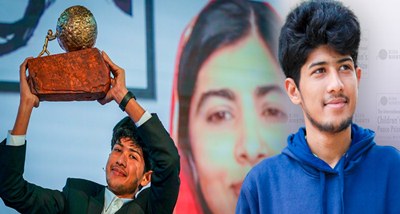
(Source: News on AIR)
3. QRSAM System successfully hit target aircraft at medium range and altitude.
- Quick Response Surface to Air Missile System (QRSAM System) has successfully hit a target aircraft at medium range and medium altitude.
- The missile was launched from ITR Chandipur off the Odisha coast.
- QRSAM system can detect and track targets on the move and engage a target with short halts.
- QRSAM system:
- It is a short-range surface to air missile system that is designed and developed by DRDO.
- The missile system is a canister based system (stored and operated from specially designed compartments) and is fully indigenous.
- The missile is propelled by a single-stage solid propellant rocket motor.
- Bharat Electronics Ltd, Bharat Dynamics Ltd and private player L&T have manufactured the weapons system elements.
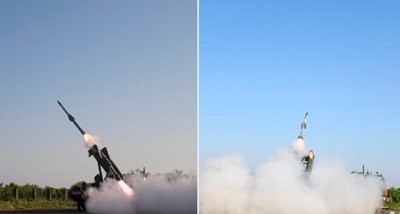
(Source: News on AIR)
4. CSIR-SERC develops new emergency response technology.
- Structural Engineering Research Centre (SERC) has indigenously developed an Emergency Retrieval System (ERS) to restore power quickly if transmission line towers fail.
- SERC has signed an agreement for the licensing of ERS technology with Advait Infratech, Ahmedabad.
- Emergency Retrieval System is a lightweight modular system that works as a temporary support structure to retrieve power immediately in the event of the collapse of transmission line towers due to natural calamities or man-made disasters.
- It can be assembled quickly to restore power in 2-3 days.
- This indigenous technology will serve the common people suffering during a disaster and the power companies that face huge monetary loss in the event of a disaster.
- SERC is a Chennai-based constituent laboratory of the Council of Scientific and Industrial Research.
5. Lonar Lake in Maharashtra and Keetham lake in Uttar Pradesh added to Ramsar sites.
- The Ministry of Environment, Forest and Climate Change has announced that Lonar lake and Keetham lake have been added to the Ramsar site list.
- Lonar lake is the only crater lake of the country in Maharashtra, while Keetham lake, also known as Sur Sarovar lake, is in Agra of Uttar Pradesh.
- Ramasar convention was signed on 2 February 1971 in Ramsar, Iran, for the protection of wetland sites in the world. It provides the framework for the conservation and wise use of all wetlands through local and national actions and cooperation. It is also known as the Convention on Wetlands.
- India now has 41 wetland sites under the Ramsar list.
- Chilka lake was the first Indian wetland added to the Ramsar site list in 1981.
- The other new Wetland sites added in 2020 are :
- Maharashtra: Nandur Madhameshwar
- Punjab: Kehsopur-Miani, Beas Conservation Reserve and Nangal
- Uttar Pradesh: Nawabganj, Parvati Agra, Saman, Samaspur, Sandi and Sarsai Nawar
6. BRICS STI Declaration 2020 has been adopted in 8th BRICS Science, Technology and Innovation meeting.
- In the 8th BRICS Science, Technology and Innovation Ministerial meeting BRICS STI Declaration 2020 has been adopted by the member countries.
- Indian government informed that it had started an integrated response against the COVID-19 pandemic, which includes the development of indigenous vaccine, diagostic and therapeutic formulation based on traditional knowledge, etc.
- India has also launched a scheme ‘SERB-POWER’ to encourage and support women researchers in the field of Science and engineering.
- BRICS STI 2020 Declaration will set the roadmap of cooperation in the field of Science and technology.
- BRICS:
- It is a group formed by five major emerging countries- Brazil, Russia, India, China and South Africa.
- Originally the first four were classified as BRIC in 2006. South Africa joined the group in 2010.
- Together these countries represent 42% of the population, 23% of global GDP, 30% of geographical regions and 18% of global trade.
- Russia will host the 12th BRICS summit.
7. 15 countries signed RCEP at Hanoi regional summit.
- Regional Comprehensive Economic Partnership (RCEP) has been signed at a regional summit held in Hanoi, capital of Vietnam. With the signing of RCEP, the world’s largest free-trade bloc has been formed.
- The summit was held virtually due to the COVID-19 pandemic. Vietnam hosted the ceremony during which the signing of RCEP took place.
- Vietnam is the ASEAN chair for 2020. “Cohesive and Responsive” is the theme for its ASEAN chairmanship.
- The ceremony was held on the sidelines of the 37th ASEAN Summit held virtually.
- The leaders have left open the option for India. India can re-apply and restart negotiations for RCEP membership.
- Now, member countries will ratify RCEP and it will come into effect within two years.
- Regional Comprehensive Economic Partnership (RCEP):
- RCEP negotiations were launched in 2012 during ASEAN Summit in Cambodia. It consists of 15 members. They are 10 ASEAN countries, China, Japan, South Korea, Australia and New Zealand.
- RCEP members stand for 30% of world economy and 30% of global population. It is the largest trade bloc.
- This is the first trade agreement involving China, Japan and South Korea.
- India and US are not part of the RCEP. India had exit RCEP negotiations in November 2019.
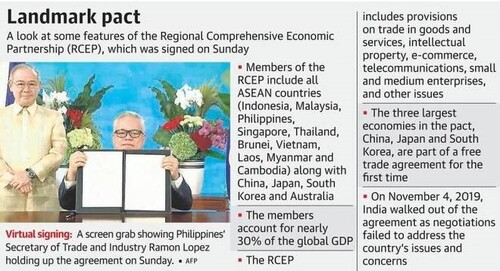
(Source: The Hindu)
8. FSSAI decides to form Food Safety Co-ordination Committee (FSCC).
- Food Safety and Standards Authority of India (FSSAI) has decided to form Food Safety Co-ordination Committee (FSCC).
- FSCC will manage food safety emergencies in the country. FSSAI CEO Arun Singhal will act as chairperson of the committee.
- FSCC will have 15 members. They will include joint secretaries from various Ministries and government departments. In addition to joint secretaries, FSCC will have the following members:
- Director of Export Inspection Council of India
- Director of National Centre for Disease Control
- A representative from Indian Council of Medical Research
- Four senior officials from the FSSAI
- The FSCC has been formed under the national Food Safety Emergency Response (FSER) system framework developed by FSSAI.
- The framework gives a summary of procedures to be used for multi-sectoral co-ordination, roles, responsibilities and management actions at the time of food safety emergency situation.
- Section 16 (3) (v) & (vi) of FSS Act prescribes the actions related with food safety emergency situation.
- The actions under Section 16 (3) (v) & (vi) include the collection and analysis of scientific and technical data for the identification of emerging risks and the introduction of rapid alert system.
- Section 16 of Food Safety and Standards (FSS) Act, 2006, provides for duties and roles of FSSAI.
9. ‘Prerna Sthal’ has been inaugurated at Naval Dockyard in Visakhapatnam.
- A motivation center, ‘Prerna Sthal’, has been dedicated to the workforce of Naval Dockyard in Visakhapatnam.
- It comprises a 30.5m high National Flag Mast, inclusive of a 20x30 feet National Flag, unknown workers statues, and an arc-shaped building housing the capabilities of the Yard and its development over the ages.
- It is a symbol of self-reliance and a motivator to achieve the goals of Atma Nirbhar Bharat in repairs and refits of ships and submarines.
- It is created as part of activities for the Golden Jubilee Year of Naval Dockyard, which will start from March 2021.
- Naval Dockyard in Visakhapatnam:
- It is located in the state of Andhra Pradesh.
- It was founded in 1949 and it is one of the most important dockyards of India.
- It is famous for the repair work of naval ships.
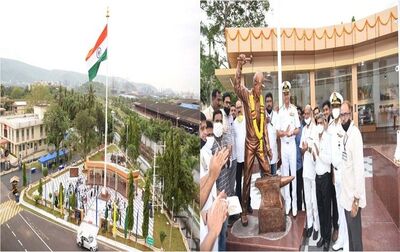
(Source: News on AIR)
10. S Jaishankar represented India at 15th East Asia Summit.
- External Affairs Minister S Jaishankar has represented India at the 15th East Asia Summit (EAS) held virtually.
- This virtual meet was chaired by the Vietnamese Prime Minister, Nguyen Xuan Phuc and joined by all eighteen East Asian countries – 10 ASEAN countries and Australia, China, India, Japan, South Korea, New Zealand, Russia and the United States.
- Various issues were discussed in this meeting, which includes ways and means to strengthen the EAS platform, pandemic and cooperation among EAS members for recovery of the economy, etc.
- The 14th East Asia Summit was held in Bangkok on 4 November 2019.
- East Asia Summit:
- It was formed in 2005 as a forum of 18 regional leaders to discuss important strategic issues in the Indo-Pacific region.
- India is a founding member of the East Asia Summit.
- EAS represents 54% of the world population and accounts for 58% of the global GDP.
11. Nitish Kumar to take oath as Bihar CM for 7th time.
- Nitish Kumar will take oath as the Chief Minister of Bihar for the Seventh time. He will start his fourth consecutive term.
- He was elected as leader of the NDA in Bihar.
- Tarkishore Prasad and Renu Devi will be the new Deputy Chief Ministers of Bihar.
- In the Bihar Legislative assembly election 2020, NDA has won 125 seats in the 243-member assembly.
- The maximum size of the council of ministers can be only 15% of the total number of seats in the assembly.
- Appointment of a Chief Minister:
- Article 164 states that the Chief Minister shall be appointed by the Governor and the other ministers shall be appointed on the advice of Chief Minister.
- The article also states that the total number of Ministers, including the chief minister of state, shall not exceed 15% of the total strength of the State Legislative Assembly.
- Qualifications for Chief Minister:
- He/She should be a Citizen of India.
- He/She should be of 25 years of age or more.
- He/She should be a member of either house of the State Legislature. In case, not an MLA/MLC, he/she can be elected as Chief Minister. But he/she should become an MLA/MLC within six months from the date of their appointment.
- Functions of Chief Minister:
- Advises the Governor regarding the appointment of other Ministers and decides the portfolios for them
- Presides over the cabinet meetings
- All the decisions taken by the government are shared with Governor and provides information regarding decisions of other ministers as and when asked by the Governor
- Advises the Governor for dissolution of the Legislative Assembly, which may or may not accept his advice
- Council of Ministers is collectively responsible to the State Legislative Assembly
- Bihar:
- It is located in the eastern part of India.
- It shares its boundary with Uttar Pradesh, Nepal, West Bengal and Jharkhand.
- It is divided into two parts by the river Ganga.
- It is the third-largest state by population and twelfth-largest by territory.
- It has 40 Lok Sabha seats, 16 Rajya Seats and 243 Legislative assembly seats.
- Phagu Chauhan is the Governor of Bihar.
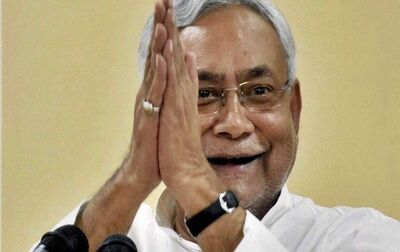
(Source: News on AIR)
12. Jharkhand Foundation Day: 15 November
- Jharkhand was formed on 15 November 2000 as the 28th state of India by Bihar Reorganisation Act.
- The state foundation day coincides with the birth anniversary of tribal leader Birsa Munda.
- At the time of formation, the Jharkhand state had 18 districts. Later, six more districts were added.
- Jharkhand:
- It is a state in eastern India that shares its border with Bihar, Uttar Pradesh, Chattisgarh, Odisha and West Bengal.
- It is 15th largest state of India by area.
- It is also known as the land of the forest.
- The most famous dance of Jharkhand is Chhau.
- It has 14 Lok Sabha seats, 6 Rajya Sabha seats and 81 Legislative assembly seats.
- Its capital is Ranchi.
- Governor: Draupadi Murmu, Chief Minister: Hemant Soren
- Munda, Santhal, Oraon, Kharia, Gond are tribes of Jharkhand.





 13 November 2020 Current Affairs
13 November 2020 Current Affairs 






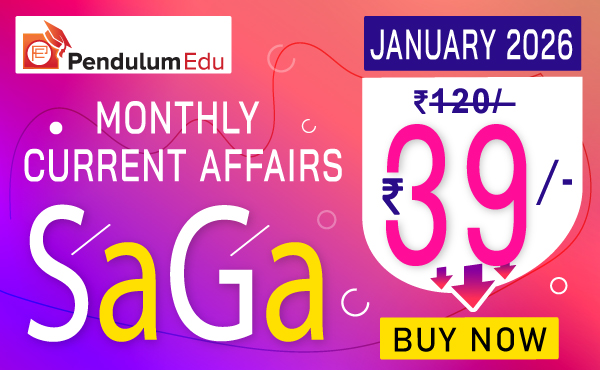

Comments